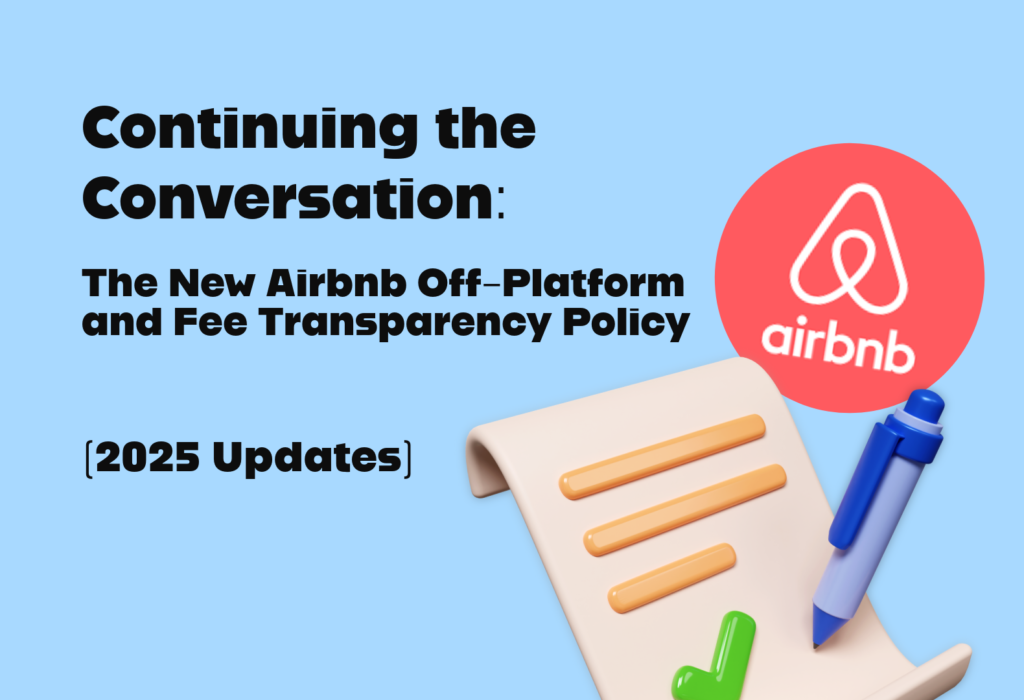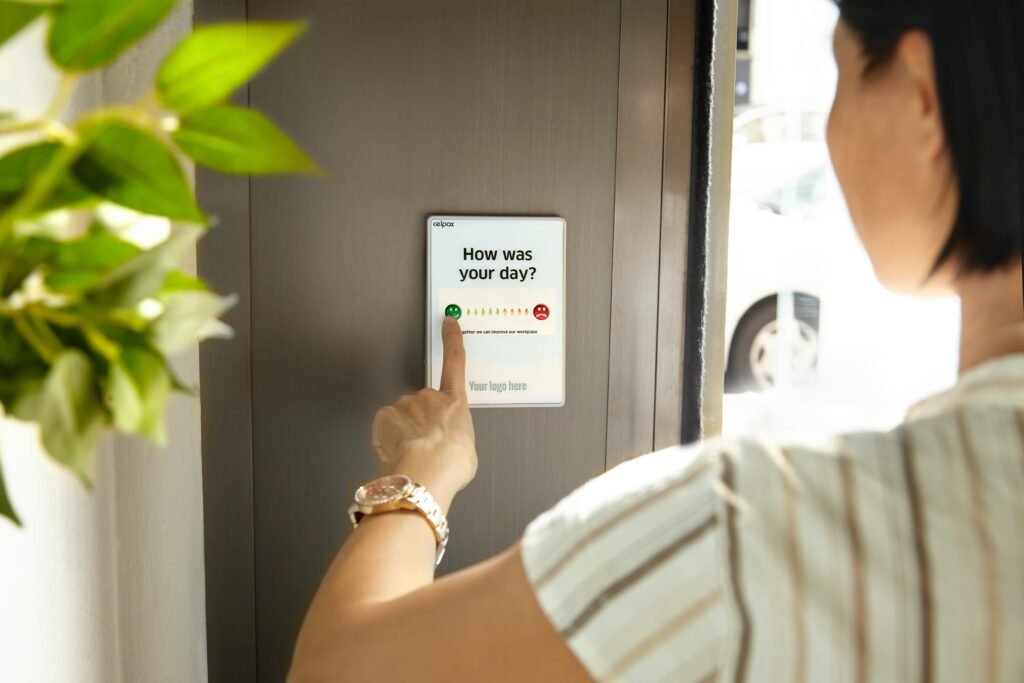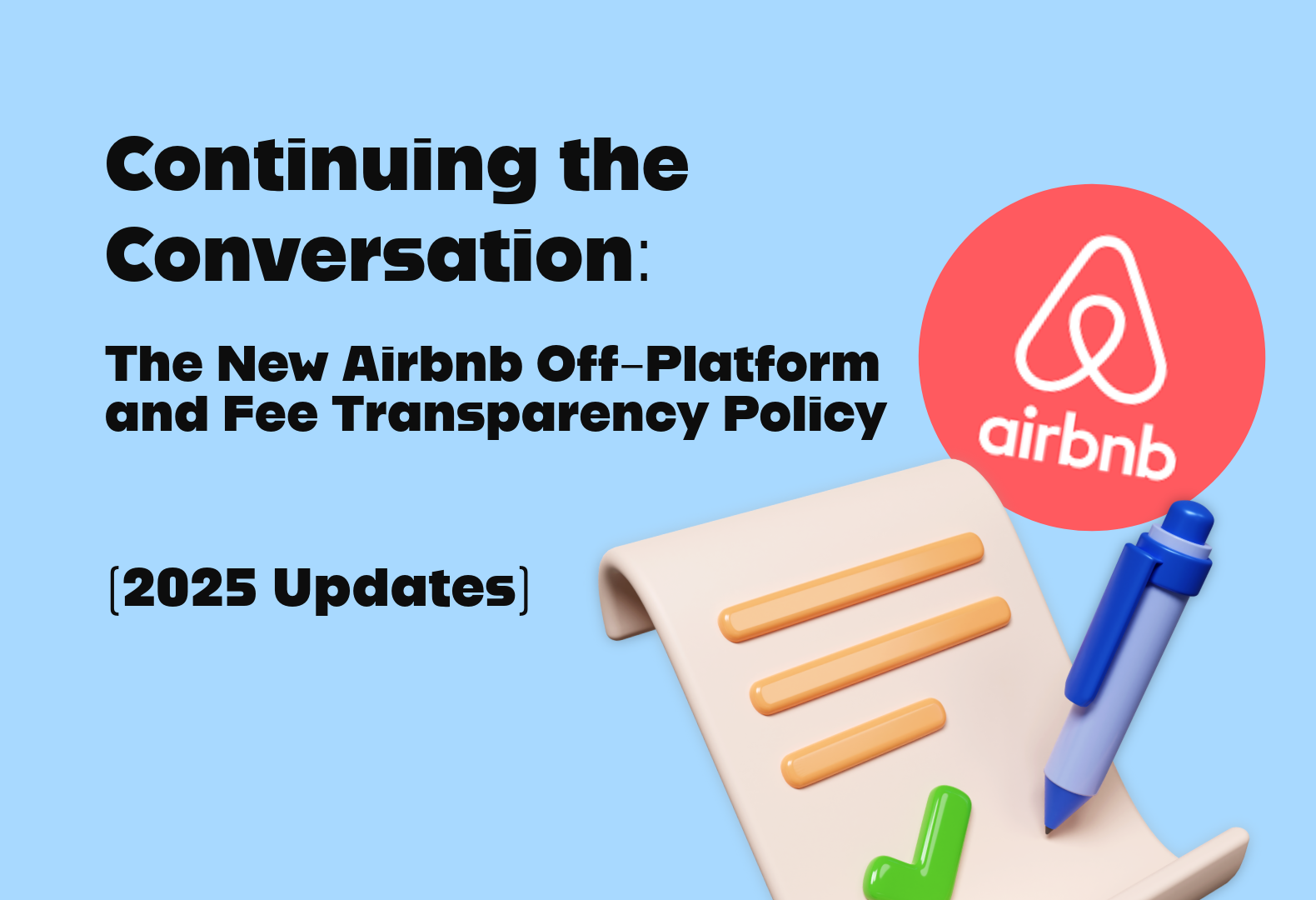
Requirements for Sharing Fees and Clear Pricing Information
One important aspect of the new Airbnb policy is to make fees more transparent. Here’s what you should know and do about pricing and fees to follow the new rules:
- Include All Fees in Your Airbnb Price:
When guests book an Airbnb, they may have to pay additional fees beyond the basic nightly rate. These “mandatory fees” can include cleaning fees, pet fees, extra guest fees, and resort fees for amenities.
New guidelines require you to include all these fees in the price shown to guests at checkout. If there’s a specific spot for a fee on Airbnb, use it. If not, adjust the nightly rate to cover the cost.
For example, if you charge a $20 nightly resort fee for pool access, enter it in the designated area if available. If there’s no option, simply increase your nightly rate by $20. Avoid stating that the fee will be charged at check-in, as it should be included in the booking price upfront. Transparency about all costs is key! - No Last-Minute or Surprise Fees:
You cannot suddenly charge guests extra fees after they have booked. Any fees, like for linens or WiFi, must be clearly mentioned in your listing before they pay. If you bring up additional charges at check-in, guests can refuse and report you, and Airbnb will likely side with them. The total price at booking should include everything except a security deposit. Always check: “Did the guest already pay for this fee?” If not, don’t charge it. - Use the “Change Reservation” Feature for Adjustments:
Life happens! Sometimes guests may want to add an extra person or extend their stay. Always use Airbnb’s tools to handle these changes and any associated costs properly.
If a guest wants to extend their stay, send a change request through Airbnb for the extra night. If they bring an undeclared pet and a pet fee applies, request a reservation update to include that fee instead of accepting cash.
Avoid saying things like, “Just pay me $100 in cash,” as it breaks the rules and leaves you unprotected in case of disputes. Keep all changes through Airbnb to ensure everything is documented and secure! - Security Deposits and Damage Payments Explained:
Most Airbnb hosts can no longer collect security deposits directly from guests. While Airbnb may place a hold on a guest’s credit card for deposits, this option is mostly unavailable for regular hosts. Therefore, do not request cash deposits upon check-in.
To protect against damages, utilise Airbnb’s AirCover insurance. If there is damage after a guest checks out, you can request compensation through the Airbnb Resolution Centre using the guest’s credit card information.
Only selected hotels or special hosts with Airbnb’s permission can collect cash deposits. Most hosts in Australia should update their house rules to remove mentions of security deposits. - Taxes and Regulatory Fees:
When renting out your space on Airbnb, you may need to collect certain taxes or fees that Airbnb doesn’t handle. Local governments often require hosts to charge a tourism tax for each night guests stay, so it’s crucial to inform guests about any applicable fees.
In Australia, Airbnb manages the Goods and Services Tax (GST) on service fees, but hosts are responsible for taxes on rental income. While there’s usually no separate tourist tax, some remote areas may have specific fees.
If you need to charge taxes or special fees, clearly mention them in your listing description and consider providing an invoice or receipt for tracking. Remember, you cannot add your own service fees; only government-required fees are permitted. If possible, it’s best to include these fees in your overall price. - Optional Services and Fees Explained:
If you offer optional services, such as firewood, airport pick-up, or late check-out, for an extra fee, they should not be included in the main listing price. Guests can choose whether to use them. To manage these fees, consider the following options:
1. Use the platform’s add-on features or inform guests that you’ll send a payment request through the platform if they opt for an extra service.
2. For services like late check-out, use the Resolution Centre to request payment by going to the reservation, clicking “Send or Request Money,” and adding a note explaining the fee.
This keeps everything transparent and compliant!
As an Airbnb host, avoid accepting cash or direct payments for extra services, as this counts as a fee related to your booking. Only hotels can sometimes allow guests to pay for things like parking or breakfast at check-in.
If you’re renting a homestay or vacation rental, keep all payments through Airbnb. Also, make sure any optional fees are truly optional. Be upfront about all unavoidable fees to avoid confusion. - Transparency in Listing Description:
When listing your property, clearly explain any fees or rules guests should know, even if they’re included in the total price. For instance, say, “A $75 cleaning fee is included in your total,” or “You can bring one dog, and the pet fee is included if you have indicated this.” Being upfront prevents misunderstandings. If there is a special charge, such as a tax to be paid upon arrival, please be sure to mention it. This helps you stay compliant and avoids surprises that could lead to bad reviews. - Australian Context – No Drip Pricing:
In Australia, new rules require businesses like Airbnb to show all prices upfront, with no hidden fees clearly. This change helps protect consumers from being misled. The Australian Competition and Consumer Commission (ACCC) has previously criticised Airbnb for not being transparent about service and cleaning fees.
For Airbnb hosts, it’s crucial to disclose all charges, including cleaning fees. Failing to do so can lead to rule violations and potential legal issues due to misleading information. Transparency is essential for building trust with guests.
Make sure that the price guests see on Airbnb is what they actually pay, except for certain items like taxes or refundable deposits. If your pricing is transparent, you’re in good shape; if not, it’s time to update your listing. Lack of transparency can lead to guest complaints, negative reviews, and even penalties from Airbnb. Being upfront about your prices can also enhance your reputation with guests.

Rules and Consequences for Not Following Them
Airbnb takes its rules seriously and works hard to make sure they are followed. If you’re a host, it’s important to know how they find out about any rule-breaking and what might happen if you do not follow the guidelines.
- Automated Message Monitoring:
Airbnb uses automatic systems to check messages for prohibited content. If you attempt to send information such as an email address, phone number, or terms like “PayPal” or “cash,” your message may be flagged, blocked, or partially hidden before a booking is completed. Even after booking, asking for specific payment methods could also trigger a warning. These checks help ensure safety and compliance. If someone repeatedly tries to bypass these rules, it may alert Airbnb’s Trust & Safety team. - Guest Reporting:
On Airbnb, guests can report hosts who ask for payment outside the platform. If this happens, Airbnb will take it seriously and likely act quickly. Guests can also complain if they feel uneasy about any off-platform communication. Airbnb generally supports guests in these cases and will investigate the host’s messages. Be mindful of what you write, as it may be shared with Airbnb if there’s an issue. - Warning Notices:
If a host on Airbnb makes a minor mistake or breaks the rules for the first time, they receive a warning email. This email explains what went wrong and reminds them that sharing contact information or making payments outside of Airbnb is not permitted. It usually warns that repeated violations could lead to losing their listing or account. It’s important to take these warnings seriously. - Cancellation of Bookings:
If Airbnb discovers that you and your guest are trying to move a booking outside of their platform, they might cancel the reservation. This can be problematic for both guests and hosts. The guest could lose their stay or need to rebook, while the host may face penalties, including a warning on their account. Although it’s rare for Airbnb to cancel completed bookings, they may not be able to assist if an issue arises, especially if payments were made off-platform, as this would violate their rules. - Account Suspension or Removal from Airbnb:
Airbnb can temporarily disable your listing or permanently remove you from the platform if you break their rules. A suspended listing means no new bookings while they investigate, while a permanent removal means you can’t use Airbnb anymore.
Serious rule violations can lead to a ban, especially if:
– You’ve been warned before, but ignored it.
– You commit a serious offence, like trying to scam a guest.
– Airbnb sees a pattern of rule-breaking in your actions.
Airbnb doesn’t provide specific numbers about its policies, but it takes rule-breaking seriously. For instance, they removed approximately 4,000 hosts in one year due to discrimination. Since trust is important to them, hosts who try to move bookings off the platform risk being expelled. - Losing Your Superhost Status or Visibility:
If you break Airbnb’s rules, you risk losing your Superhost status during their evaluations. There is also a possibility that Airbnb could lower the search ranking of listings from hosts who have policy violations. While not confirmed, it makes sense that they wouldn’t promote listings from hosts with known issues. So, following the rules could affect how easily guests find your listing. - Host Liability:
If you host on Airbnb and take payments outside of the platform, you could lose important protections. Airbnb’s guarantee won’t cover any deals made off their system, meaning you’ll be on your own if something goes wrong. Not following the rules might not only leave you vulnerable but also cost you the safety net that keeps your hosting business secure. - Guest Refunds at Host’s Expense:
If a guest pays a fee that was not mentioned beforehand, they can request a refund from Airbnb. If Airbnb finds the charge is against their rules, they may give the guest their money back and take it from the host’s future payouts. For example, if a host secretly charges a guest $100 for cleaning, Airbnb could refund that amount and deduct it from the host’s earnings. This results in the host losing money and facing penalties, which is not beneficial for anyone involved. - Legal Consequences:
Not following certain rules can lead to serious legal consequences. Misleading pricing in listings may attract attention from legal authorities, such as the Australian Competition and Consumer Commission (ACCC). While they typically target larger companies, it is also crucial for individual Airbnb hosts to comply.
Enforcement Example: Imagine a host in Sydney messages a guest, suggesting they cancel their booking and pay directly through a bank transfer to save on fees. Feeling uneasy, the guest reports this to Airbnb.
Airbnb would quickly step in, possibly warning or suspending the host for breaking the rules. The host might wake up to an email from Airbnb explaining the violation, and if they have a history of similar issues, their account could get shut down.
Airbnb would also reassure the guest not to follow the host’s suggestion and may help them find new accommodations. In the end, the host risks losing not just that booking but their entire business on the platform.

Airbnb has strict rules that they enforce using technology. If you’re a host, take any warnings seriously. The best way to avoid issues is to follow all the guidelines. This way, you’ll mostly only interact with Airbnb’s Trust & Safety team for routine checks. Keeping a good hosting record is key to having a long and successful hosting experience.
Feedback and Insights from Hosts
The introduction of the Off-Platform Policy, along with new rules about fees, has sparked a lot of conversations among Airbnb users.
- Initial Confusion and Concern:
When Airbnb introduced new changes via emails and notifications in early 2024 and 2025, many hosts were confused about how these changes would affect them. Hosts using property management tools or unique check-in methods were particularly worried. For example, Australian hosts asked online if they could still use WhatsApp groups to communicate with guests; it’s allowed as long as guests agree and the rules are followed. Some hosts also wondered if they should remove PDFs of their house manuals that included personal phone numbers, which is fine to share after booking. As Airbnb provides more straightforward guidelines and hosts share their insights, this confusion is beginning to clear up. - “Airbnb Protecting Its Fees” Sentiment:
Many Airbnb hosts believe the company primarily focuses on protecting its profits. By stopping bookings made outside its platform, Airbnb ensures it collects its service fee for every reservation. Some hosts are frustrated, wanting to save money by connecting directly with guests they found. However, others recognise that these rules have always been part of the business. As expert Julian Sage noted, the policy helps Airbnb maintain control and secure its income. Understanding this, hosts realise that trying to bypass the rules isn’t worth it, as Airbnb is serious about keeping bookings through its platform. - Debate Over Privacy and Safety:
Many Airbnb hosts are concerned about a new rule that limits their ability to check guests’ identities. Some feel this change, which only allows asking for IDs when legally required, reduces their safety measures against fraud and unwanted parties.
Conversely, many guests and some hosts appreciate the move, as it protects personal information and prevents hosts from requesting unnecessary details. Most hosts trust Airbnb’s guest vetting and review system and are adjusting their booking settings to ensure safety, such as requiring ID verification or positive reviews. - Feedback on Fee Transparency:
Many hosts are pleased about the move towards more straightforward pricing on Airbnb. Those who have always been transparent feel that hidden fees gave some hosts an unfair edge by displaying lower prices. Now, with the changes, everyone benefits from a level playing field.
In discussions on Airbnb’s host community, many express relief, saying that hidden fees hurt their reputation. Some hosts in the US who tested the new total price display found guests appreciated seeing the full cost upfront. In Australia, many hosts already include all expenses in their prices, as that’s what travellers expect. However, some property managers who used to add extra “booking fees” are now challenged to change their pricing to meet the new standards. - Professional Hosts & Software Users:
Property managers, particularly those with numerous vacation rentals in Australia’s popular coastal areas, often rely on various systems to manage their listings. Recently, there was concern among these hosts that Airbnb was banning the use of outside tools. However, a study clarified that Airbnb is not completely banning third-party technology; instead, it is encouraging hosts to use integrated services.
Hosts can still use management tools like channel managers, but they must ensure that these tools do not require guests to leave the Airbnb platform. Many property managers are adjusting by sending automated messages through Airbnb and using its own hosting tools more often. While this requires some adjustments, large operators can continue to succeed on Airbnb as long as they adhere to the new guidelines. - Creative Solutions: How Hosts Are Adapting to Rules
Many experienced hosts are finding innovative ways to comply with Airbnb’s rules while still maintaining a connection with their guests. For example, some hosts are using the Wi-Fi login page to collect guest emails for a mailing list, allowing guests to voluntarily sign up while accessing the internet.
Others are placing QR codes or cards in their homes, inviting guests to join a “VIP list” for future stays. Since these approaches don’t happen within Airbnb’s messaging system, they may find a loophole in the rules.
While most hosts aren’t taking extreme measures, these examples show their efforts to maintain direct relationships with guests. However, hosts must be cautious, as Airbnb may consider these tactics as rule circumvention if discovered. - Positive Guest Feedback Loop:
Some hosts have found that including all fees in the total price benefits everyone. Guests can see the full cost upfront, reducing complaints about hidden charges. For example, a host in Melbourne noticed that after she stopped collecting a security deposit and a small fee for a welcome bottle of wine, her reviews praised her “transparent pricing.” While she may have lost a bit of extra income, she gained goodwill and more 5-star reviews.
Many hosts subtly acknowledge that being required to keep things simple on the Airbnb platform has made their lives easier, resulting in fewer awkward money conversations with guests. - Hosts in Australia specifically:
Australian hosts often list their properties on websites like Stayz, Booking.com, and Airbnb. While Airbnb has strict rules, it can also be a convenient option. For example, Airbnb manages security deposits through AirCover, whereas hosts on Booking.com are responsible for handling them themselves.
However, hosts juggling multiple platforms face challenges because each one has different regulations. Some prefer directing guests to platforms that allow security deposits and agreements. Yet, many are starting to believe Airbnb’s approach could become the industry standard, leading them to simplify their processes by avoiding off-platform agreements altogether. - Communicating During Emergencies:
Hosts often worry about reaching guests if Airbnb’s messaging fails or if the guest lacks internet. Fortunately, if you have a booking, you can use the guest’s phone number to call or text for urgent matters. Airbnb allows this as long as you use the information responsibly. Many hosts have realised that this concern is mostly unnecessary, as Airbnb doesn’t penalise them for the typical use of phone numbers.
Hosts have mixed feelings about Airbnb’s rules—some accept them, others support them, and a few are frustrated enough to think about leaving. However, for most, Airbnb is their primary source of guests, so they follow the rules as part of the job. One host in an Australian Facebook group stated, “We might not love all the rules, but we need them to keep getting bookings.” Many are educating themselves and adjusting their practices to adapt to the new reality.

Easy Tips for Hosts to Follow the Rules
To steer clear of penalties and succeed with Airbnb’s guidelines about off-platform bookings and transparent fees, hosts should follow these simple steps:
- Keep All Communication on Airbnb:
Always use Airbnb’s messaging for all conversations and bookings. If a potential guest wants to book directly, please inform them that you only accept bookings through Airbnb for safety reasons. After booking, continue using Airbnb’s messaging, and only switch to phone or WhatsApp if the guest requests it. This keeps a record and follows Airbnb’s guidelines. - Don’t Share Personal Contact Information Before a Booking:
Wait to provide your email, phone number, or website until a guest’s booking is confirmed. Airbnb’s rules prohibit sharing contact details beforehand, and including them in your listing can result in removal or flagging. Stick to communication through the platform to stay compliant. - Always Use Airbnb for Payments:
All payments for a stay must be made through Airbnb, including costs such as cleaning and pet fees. Avoid requesting cash or direct payments. For any extra fees, include them in the original reservation or request changes through Airbnb. If a guest wants to pay you directly to avoid fees, politely decline and explain that payments need to go through Airbnb. This helps protect both you and the guest by keeping a clear record and ensuring support from Airbnb is available if needed. - Show All Fees in Your Listing:
Make sure to check your pricing on Airbnb. Use the designated sections for any mandatory fees, like cleaning, extra guests, or pets. If a fee doesn’t fit any category, include it in your nightly rate. Ensure that the total price guests see at checkout includes everything they need to pay. Additionally, update your house rules and description to remove any references to extra charges. This way, you’ll be transparent about costs and avoid disputes with guests. - Don’t Charge Security Deposits (unless you have permission):
Most hosts cannot request a security deposit through Airbnb, so remove any mention of it from your listing. Only a few approved hosts can handle deposits, and they should clearly state this. Everyone else should use AirCover for damage protection to stay compliant and ensure a smoother check-in process. - Use the Airbnb Resolution Centre for Extras or Issues:
If an issue arises during your Airbnb stay that needs extra charges or a refund, use Airbnb’s Resolution Centre or the change reservation option. For example, if a guest wants a late check-out for a fee, ensure it’s mentioned in your listing first, then request payment through Airbnb rather than cash. This helps you follow the rules and keeps a record in case of disputes. - Simplify Check-In for Guests: Ensure your check-in process doesn’t require guests to use any outside apps or websites.
Here are some tips:
– If you use smart locks, find out if you can provide entry codes directly without needing an app.
– If registration is needed, mention it in your listing and collect info through Airbnb messages instead of a separate form.
Make it easy for guests to enter your property using just the information you provide via Airbnb. This may involve sending clear instructions and entry codes in advance. - Be Clear in Your Listing Description:
Inform guests of any special rules upfront. For example, please mention if you need their name and vehicle details at least 24 hours before arrival. If ID is required by law, say that too. Also, clarify what’s included in the price, like “cleaning fee included” or “additional $50 for pets.” Providing this information helps prevent misunderstandings in the future. - Protect Guest Information:
Always handle guest details carefully. Do not add their contact information to mailing lists or share it, as this violates Airbnb’s rules and privacy laws. If you want to invite loyal guests back, do so through Airbnb with a special offer instead of sending emails. Remember, Airbnb monitors messages, so only use their platform for important trip-related communication. - Stay Updated on Airbnb Policies:
Airbnb can change its rules and send emails to hosts about these updates. Please review these emails and adjust your practices accordingly. If you get a warning for breaking a rule, take it seriously and fix the issue quickly, whether it’s updating your listing or changing your communication. You typically get just one warning, so making the necessary changes can help improve your standing over time. - Connect with Your Hosting Community for Guidance:
If you have questions about rules or policies, check Airbnb’s Help Centre for clear info. You can also ask other hosts in community groups, such as the Airbnb Community Centre or Facebook. They can help clarify what’s allowed, but always trust official resources over personal opinions. Staying informed will help you avoid mistakes. - Use All-Inclusive Pricing:
Promote your rental with “no hidden fees” to highlight transparency and stand out. This simple approach can attract more guests. If you’re in Australia, mention that “all taxes and fees are included in the price you see,” as it reassures travellers that you’re following the rules. - Keep Professional Boundaries:
Treat Airbnb as a professional platform for your business. Avoid actions you wouldn’t want shared. For example, instead of saying, “Text me if you need anything,” say, “Message me on Airbnb – I reply quickly there.” This encourages guests to use Airbnb’s messaging system and helps maintain boundaries.
By following these simple tips, you can maintain a good standing with your Airbnb account and provide a better experience for your guests. Airbnb’s stricter rules encourage good practices that enhance your reputation.

Remember to keep everything on the Airbnb platform and be transparent to avoid problems. Compliance builds trust with guests and with Airbnb, which is essential for your success as a host.
